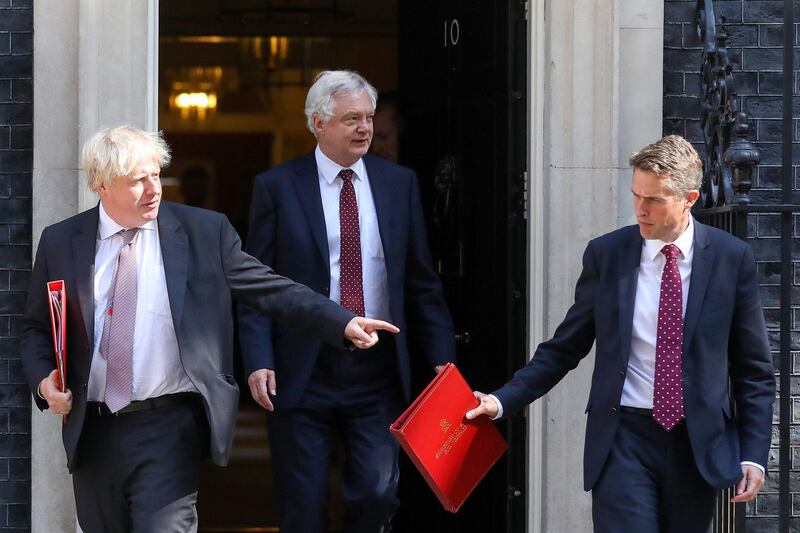Prime minister Theresa May is battling a Cabinet revolt over her plan to tie the UK closely to European Union trade rules, in a clash that risks destroying the chance to break the deadlock in Brexit negotiations.
Just hours before Mrs May’s team is due to finalise the UK blueprint, her Brexit secretary David Davis is fighting her over her proposal for a close customs deal with the EU, a person familiar with the matter said.
Mr Davis also wants to ditch the PM’s plan to align British regulations on goods with the EU’s rules to smooth trade in key sectors such as manufacturing and agri-food, while other ministers are also deeply opposed. For her part, the premier is ready for the fight, one of her senior allies said.
“If true, this would be a complete breach of Theresa May’s manifesto commitment” to leave the EU single market, customs union and the bloc’s court, said Owen Paterson, a former cabinet minister and Brexit campaigner. “We would be out of Europe but still run by Europe.”
The rebellion by Mr Davis – the minister leading Britain’s divorce negotiations – with the EU came as Mrs May settled on the type of Brexit she wants. The EU is pushing Mrs May to come up with a credible and workable plan for the future trade relationship, warning that time is running out for negotiating an agreement before exit day next March.
Mrs May has summoned her Cabinet to an all-day meeting at her country residence, Chequers, on Friday, with the goal of securing their agreement for an overarching plan to take to the EU. She’s proposing the UK should leave the EU’s customs union, but collect tariffs at EU rates on goods crossing the border destined for the bloc.
At least three cabinet-level Brexit campaigners are said to be against Mrs May’s so-called “white paper” on the future UK-EU trade deal, which she sent to ministers on Thursday. People familiar with the matter said Brexit backers among Mrs May’s top team are worried that she’s betraying their vision of a clean split with the bloc that will enable Britain to strike free trade deals with countries around the world such as the US.
Pro-Brexit ministers are angry that the plan was developed without consulting senior cabinet members who were supposed to be working on a customs solution. It has also received a chilly response from German chancellor Angela Merkel’s government.
A draft of Mrs May’s proposal was leaked on Thursday, including a line saying it wouldn’t “allow the UK to accommodate a likely ask from the US in a future trade deal.” That upset the “Brexiteers” in the cabinet who have made an American trade deal one of their key aims.
Mrs May’s office hit back at the leak, with one official saying the line had been selectively quoted. The prime minister’s spokeswoman Alison Donnelly said Mrs May remains committed to seeking an agreement with America.
“It is categorically untrue to suggest that we will not be able to strike a trade deal with the US,” she said.
According to one of Mrs May’s Cabinet allies, who spoke on condition of anonymity, the prime minister views other kinds of relationship with the EU – typically ones modelled on Canada’s or on Norway’s – as either unacceptable or unworkable.
Quitting without a deal, as proposed by some in her Conservative Party, would leave the UK in a bitter and acrimonious relationship with the EU just as it was trying to sort out the series of side-deals in areas such as aviation that Britain would still need.
While Mrs May’s delay in making a decision on Brexit has been characterised by weakness, and left some in her government wondering if she would ever make a decision, the minister said this had been a strategy aimed at leading her internal opponents to the same conclusion as her about the viable options.
At Chequers, the minister said, she was prepared to push for what she wanted, even if it meant upsetting people.






